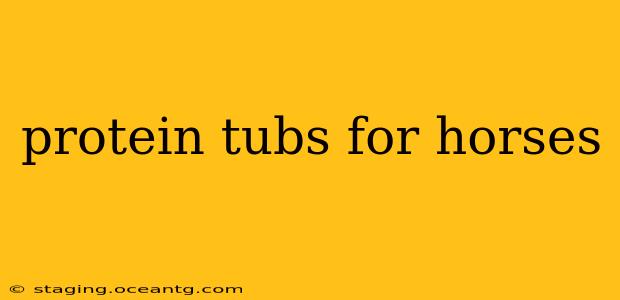Choosing the right protein supplement can significantly impact your horse's health, performance, and overall well-being. Protein tubs offer a convenient and often cost-effective way to boost your horse's protein intake, especially beneficial during periods of high demand like intense training, growth spurts, or recovery from illness. However, navigating the world of equine protein supplements can be confusing. This guide will help you understand the benefits, considerations, and factors to keep in mind when selecting protein tubs for your horse.
What are the benefits of using protein tubs for horses?
Protein is essential for building and repairing muscle tissue, supporting a healthy immune system, and maintaining overall body function. Protein tubs provide a concentrated source of protein, making them particularly useful when a horse's dietary needs exceed what's provided through hay and grain alone. Benefits include:
- Improved Muscle Development and Recovery: Essential for growing young horses and those in intense training, promoting faster muscle repair after strenuous activity.
- Enhanced Immune Function: Protein is a crucial component of antibodies and other immune system components, helping your horse fight off illness.
- Increased Performance: Adequate protein intake can lead to improved stamina, speed, and overall athletic performance.
- Better Coat Condition: A well-nourished horse often displays a shiny, healthy coat, reflecting adequate protein intake.
- Weight Gain (When Appropriate): For underweight horses, protein can contribute to healthy weight gain when combined with a balanced diet.
What types of protein are commonly found in horse protein tubs?
Several protein sources are utilized in equine protein supplements. Each offers unique benefits and considerations:
- Soybean Meal: A common and relatively inexpensive source of protein, often used in commercial feeds. However, some horses may have sensitivities to soy.
- Soybean Oil: Used to help increase the fat and energy content of feed.
- Cottonseed Meal: Another plant-based protein source, generally considered a good option, but like soy, some horses might exhibit sensitivities.
- Dried Whey: A byproduct of cheese production, rich in protein and essential amino acids. It's highly digestible but can be more expensive.
- Meat and Bone Meal: A more complete source of amino acids, but its use can be controversial due to concerns about contamination.
How much protein does my horse need?
The amount of protein your horse requires varies based on several factors:
- Age: Growing foals and young horses need significantly more protein than adult horses.
- Activity Level: Horses undergoing intense training or competition require more protein for muscle repair and growth.
- Body Condition: Underweight horses may benefit from increased protein intake to support weight gain.
- Health Status: Horses recovering from illness or injury may need additional protein to aid in tissue repair.
Consult your veterinarian or an equine nutritionist to determine the appropriate protein level for your horse's individual needs. They can analyze your horse's diet and provide personalized recommendations.
What should I look for when choosing a protein tub for my horse?
When selecting a protein tub, consider these factors:
- Protein Source: Choose a protein source that your horse tolerates well and aligns with your budget.
- Quality: Look for reputable brands that conduct quality control and testing to ensure purity and safety.
- Added Ingredients: Some tubs contain additional nutrients like vitamins and minerals to further support your horse's overall health.
- Digestibility: Opt for highly digestible protein sources to maximize nutrient absorption.
- Price: Consider the cost per serving to compare different products effectively.
Are there any potential downsides to using protein tubs?
While beneficial, overuse or incorrect use of protein tubs can have potential drawbacks:
- Kidney Strain: Excessive protein intake can place undue stress on the kidneys.
- Imbalances: Too much protein without a balanced diet can lead to nutrient imbalances.
- Cost: Protein tubs can be more expensive than other feed options.
Conclusion
Protein tubs can be a valuable supplement for horses with increased protein needs. However, it's crucial to consult with a veterinarian or equine nutritionist to determine the appropriate amount and type of protein for your horse. Choosing a high-quality product from a reputable brand and carefully monitoring your horse's response are essential for safe and effective use. Remember, a balanced diet remains the cornerstone of good equine health.
